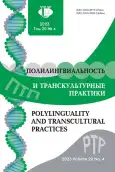Methodological Principles of Teaching Russian to Bilingual Children at Elementary School
- 作者: Grankina L.A.1
-
隶属关系:
- Belgorod State National Research University
- 期: 卷 20, 编号 4 (2023)
- 页面: 708-717
- 栏目: ARSENAL
- URL: https://journal-vniispk.ru/2618-897X/article/view/326674
- DOI: https://doi.org/10.22363/2618-897X-2023-20-4-708-717
- EDN: https://elibrary.ru/LDOZOM
- ID: 326674
如何引用文章
全文:
详细
This article is devoted to the urgent problem of identifying the methodological foundations of teaching Russian to younger schoolchildren for whom Russian is not their native language. The topic proposed for consideration is characterized by a broad scientific and descriptive context of the problem that is of interest to specialists in psychology, pedagogy and linguo-didactics, and a pronounced practical aspect that is associated with the need to develop a consistent methodological approach to teaching Russian in a mixed language group of elementary school students. Russian is the primary and only language of instruction, and the composition of the trainees is characterized by a different status of linguistic personality, including bilingual children with varying degrees of proficiency in Russian as a non-native language and children for whom Russian is their native language. Taking into account the varying degrees of proficiency in the Russian language by bilingual children at the initial moment of schooling, the purpose of the study is precisely to identify and analyze the fundamental provisions that are actualized in modern linguo-didactics on this issue. The materials of the study were modern studies in the field of pedagogy, psychology, linguo-culturology and linguo-didactics, devoted to the organization of the educational space of bilingual children learning Russian in a mixed language group. The leading method in the study is the analytical modeling of the educational environment as a condition for the formation of a student’s linguistic personality. The relevance of the research is due to both the interdisciplinary focus of the problem and the diversity of the selected topic, which requires discussion taking into account various factors of the effectiveness of the organization of training. The following principles of the organization of the educational space of bilingual children in modern primary school are substantiated as the leading ones in the study: (1) linguo-culturological, due to the complex nature of the formation of the linguistic picture of the world and communicative skills of a linguistic personality as a subject of learning; (2) competence-based, arising from objective (socio-cultural factor, normative provisions) and subjective (age, learning conditions in a particular mixed-character language team, personal orientations, the level of development of a linguistic personality and its communicativespeech ability, etc.); (3) communicative-activity, taking into account the psycholinguistic factor of the development of speech ability as the activity sphere of the linguistic personality, determined, among other things, by the space of educational communication.
作者简介
Ludmila Grankina
Belgorod State National Research University
编辑信件的主要联系方式.
Email: granikon@yandex.ru
ORCID iD: 0009-0001-1200-3298
Postgraduate student of the Department of Russian Language, Professional Speech and Intercultural Communication
85 Pobeda str., Belgorod, 308015, Belgorod, Russian Federation参考
- Davletbaeva, R.G. 2010. Methodical system of formation of the bilingual personality of a junior schoolboy: abstract: 55. Kazan. Print. (In Russ.).
- Yuzdova, L.P., and Beznogova, T.G. 2018. Mixed language as a result of interference of language systems (on the example of East Slavic languages). Philological sciences. Questions of theory and practice 7 (85). Part 1: 203–206. Print. (In Russ.).
- Yuzdova, L.P., and Lukinykh, N.V. 2018. Teaching foreign speakers and bilinguals the Russian language in primary school. Bulletin of the SUSUHP 8: 169–180. Print. (In Russ.).
- Afanasyeva, N.D., Zakharchenko, S.S., and Mogileva, I.B. 2022. Formation of the linguistic picture of the world among bilinguals. Polylinguality and Transcultural practices 19 (4): 587–595. (In Russ.).
- Bashieva, S.K., Z.R. Dokhova, and Shogenova, M.Ch. 2020. Formation of a linguistic personality in a multicultural environment. Polylinguality and Transcultural Practices 17 (4): 525–534. (In Russ.).
- Kvasnykh, G.S. 2013. Competence-based approach to the formation of the linguistic personality of a junior schoolboy. ANI: Pedagogy and psychology 3: 13–15. (In Russ.).
- Sayakhova, L.G. 2011. Competence-based approach to the formation of a linguistic personality in the linguoculturological concept of teaching the Russian language. Bulletin of Bashkir University 16 (3): 282–292. (In Russ.).
- Makeeva, S.G., and I.V. Shutkina. 2015. Formation of language competence of junior schoolchildren in the conditions of implementation of educational standards. Bulletin of Yaroslavl Pedagogical University 5 55–59. (In Russ.).
- Shurpaeva, M.I., R.S. Khalidova, and Madieva, Z.Z. 2016. Communicative orientation of teaching Russian to bilingual students at the initial stage. News of DSPU. Psychological and pedagogical sciences 3: 112–121. (In Russ.).
- Ulzytueva, A.I. 2011. Bilingual educational space as a socio-cultural phenomenon. Scientific notes of ZabGU. Series: Vocational education, theory and teaching methods 6: 127–132. (In Russ.).
补充文件









